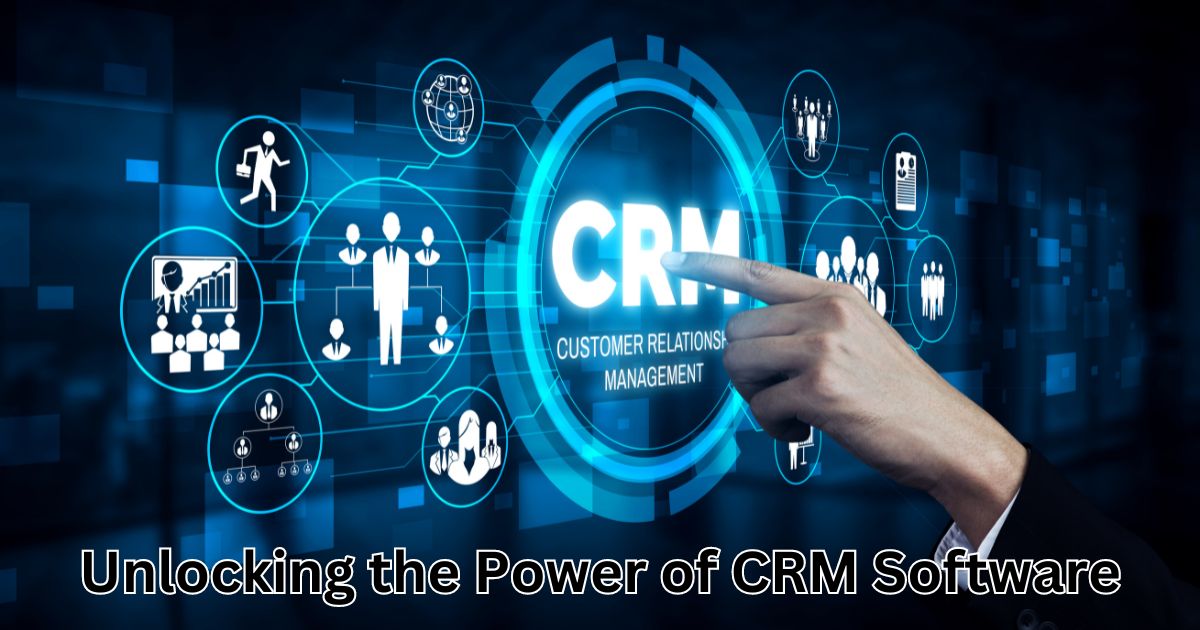Customer Relationship Management (CRM) software has become a cornerstone in modern business operations. As companies strive to build lasting relationships with their customers, Unlocking the Power of CRM Software offers the tools necessary to manage and analyze customer interactions efficiently. This guide will take you through the intricacies of CRM software, from understanding its core features to exploring how it can revolutionize your business.
Understanding CRM: What Is It and Why Does It Matter?
CRM software is a technology solution designed to manage a company’s interactions with current and potential customers. By centralizing customer data, CRM systems enable businesses to track interactions, streamline processes, and improve customer satisfaction. The importance of CRM lies in its ability to provide a 360-degree view of customers, enabling personalized marketing, sales, and service efforts.
The evolution of CRM systems has been significant. Initially, CRM was limited to simple databases, but it has since transformed into comprehensive platforms that integrate with various business tools. Today, CRM software is essential for businesses looking to maintain a competitive edge in a customer-centric world.
The Core Features of CRM Software
CRM software is packed with features designed to optimize various aspects of customer management. One of the primary features is contact management, which allows businesses to store and organize customer information in a centralized database. This ensures that all customer interactions are easily accessible and up-to-date.
Sales management is another critical feature, enabling businesses to track sales pipelines, manage leads, and forecast sales performance. Marketing automation is also a key component, allowing companies to automate repetitive tasks such as email marketing and social media posting. Finally, CRM software includes customer service and support tools that help businesses manage customer inquiries, track service issues, and provide timely resolutions.
Types of CRM Software
CRM software comes in various forms, each designed to address specific business needs. Operational CRM focuses on automating and improving customer-facing processes such as sales, marketing, and service. This type of CRM is ideal for businesses looking to streamline their operations and improve efficiency.
Analytical CRM, on the other hand, is designed to analyze customer data and provide insights into customer behavior. By leveraging data analytics, businesses can make informed decisions about their marketing strategies, product offerings, and customer service approaches. Collaborative CRM is another type, designed to facilitate communication and collaboration between different departments, ensuring that customer information is shared across the organization.
Lastly, Strategic CRM focuses on long-term customer engagement by aligning the company’s strategies with customer needs. This type of CRM is particularly useful for businesses that prioritize customer loyalty and retention.
How CRM Software Can Transform Your Business
CRM software has the potential to transform your business in several ways. First, it streamlines sales processes by providing a clear view of the sales pipeline and automating routine tasks. This allows sales teams to focus on closing deals and nurturing relationships rather than managing administrative tasks.
Enhancing customer service is another significant benefit of CRM software. By providing a centralized platform for tracking customer interactions, businesses can respond to inquiries more quickly and efficiently. This leads to higher customer satisfaction and increased loyalty.
CRM software also improves marketing efforts by unlocking the power of CRM software to enable personalized communication with customers. Through data-driven insights, businesses can tailor their marketing campaigns to meet the specific needs and preferences of their target audience. Additionally, CRM systems support data-driven decision-making by providing valuable insights into customer behavior, sales trends, and marketing performance.
Also Read: Brook Taube Wells Notice
Choosing the Right CRM Software for Your Business
Selecting the right CRM software is crucial for maximizing its benefits. The first step is to assess your business needs and goals. Consider what you want to achieve with CRM software and identify the features that are most important to your business.
Next, compare popular CRM platforms to find the one that best fits your needs. Some of the key considerations include scalability, integration capabilities, and customization options. Scalability is essential if you plan to grow your business, as you’ll need a CRM system that can expand with you. Integration is also critical, as your CRM should work seamlessly with other tools you use, such as email marketing platforms, accounting software, and customer support systems. Customization options allow you to tailor the CRM to your specific business processes, ensuring it meets your unique needs.
Top CRM Software Solutions in the Market
There are several top CRM software solutions available in the market, each offering unique features and benefits. Salesforce is one of the most popular CRM platforms, known for its robust features and scalability. It provides a comprehensive suite of tools for sales, marketing, and customer service, making it suitable for businesses of all sizes.
HubSpot CRM is another leading option, particularly popular among small to medium-sized businesses. HubSpot offers a free CRM solution with a range of features, including contact management, email tracking, and sales automation. It also integrates seamlessly with HubSpot’s marketing and service tools.
Zoho CRM is another highly regarded platform, offering a wide range of features at an affordable price. It includes tools for sales management, marketing automation, and customer support, making it a versatile solution for businesses with diverse needs.
Implementing CRM Software: A Step-by-Step Guide
Implementing CRM software requires careful planning and execution to ensure a smooth transition. The first step is planning and preparation. This involves defining your CRM goals, selecting the right software, and developing a detailed implementation plan. It’s also essential to involve key stakeholders in the planning process to ensure buy-in and support.
Data migration and integration are the next steps. This involves transferring your existing customer data into the new CRM system and integrating it with other tools and platforms you use. It’s important to ensure that your data is clean and accurate before migrating it to avoid issues down the line.
Training and onboarding are crucial for ensuring that your team is comfortable using the new CRM system. Provide comprehensive training to all users, including hands-on sessions and ongoing support. It’s also important to monitor the system’s performance and gather feedback from users to identify any issues and make necessary adjustments.
Maximizing the Benefits of CRM Software
To get the most out of your CRM software, it’s essential to follow best practices for adoption and usage. Start by driving user engagement, ensuring that your team understands the benefits of CRM and is motivated to use it regularly. This may involve setting up incentives for CRM usage or integrating it into your existing workflows.
Ongoing maintenance and updates are also crucial for maximizing the benefits of CRM software. Regularly review your CRM data to ensure it’s accurate and up-to-date. Additionally, stay informed about new features and updates from your CRM provider, and consider upgrading your system as needed to take advantage of the latest capabilities.
Overcoming Common Challenges in CRM Implementation
Implementing CRM software can come with its challenges, but with the right approach, these can be overcome. One common challenge is resistance to change. Employees may be hesitant to adopt a new system, particularly if they’re used to doing things a certain way. To address this, it’s important to communicate the benefits of CRM clearly and provide ample training and support.
Managing data quality and accuracy is another challenge. It’s essential to ensure that your data is clean and organized before migrating it to the new CRM system. This may involve deduplicating records, filling in missing information, and standardizing data formats.
Ensuring user adoption and ongoing support is also critical. Even the best CRM software won’t deliver results if it’s not used effectively. Provide continuous training and support to help your team get the most out of the system. Additionally, gather feedback regularly to identify any issues and make improvements.
CRM Software for Small Businesses
CRM software is not just for large enterprises; small businesses can also benefit significantly from using CRM systems. Affordable CRM solutions are available that cater specifically to the needs of small businesses, offering essential features at a reasonable cost.
For small businesses, unlocking the power of CRM software provides several benefits. It helps streamline operations, improve customer service, and boost sales. By centralizing customer data, small businesses can gain valuable insights into customer behavior and preferences, enabling them to tailor their marketing and sales efforts more effectively.
Case studies of successful CRM adoption by small businesses demonstrate the tangible benefits of these systems. For example, a small e-commerce business may use CRM software to track customer purchases, send personalized marketing emails, and provide exceptional customer service, leading to increased sales and customer loyalty.
CRM Software for Large Enterprises
Large enterprises often have more complex needs when it comes to CRM software. Advanced features such as multi-channel communication, predictive analytics, and workflow automation are often necessary to meet the demands of a large organization.
Integrating CRM with other enterprise systems is also essential for large businesses. This may include integration with ERP systems, marketing automation tools, and customer support platforms. By creating a unified business ecosystem, large enterprises can ensure that all departments are working together seamlessly, leading to improved efficiency and better customer outcomes.
Success stories from large corporations highlight the significant impact that CRM software can have. For example, a global retail chain may use CRM software to manage customer interactions across multiple channels, track sales performance across different regions, and provide personalized recommendations to customers based on their purchase history.
The Role of AI and Automation in CRM Software
Artificial Intelligence (AI) and automation are revolutionizing CRM software, making it more powerful and efficient than ever before. AI enhances CRM capabilities by providing advanced analytics, predictive modeling, and personalized recommendations. This allows businesses to anticipate customer needs, identify trends, and make data-driven decisions.
Automation tools are also transforming the way businesses use CRM software. By automating routine tasks such as data entry, email marketing, and lead scoring, businesses can save time and reduce human error. Automation also enables businesses to scale their operations more easily, as they can handle a larger volume of customer interactions without increasing their workload.
Predictive analytics is another key area where AI is making a difference. By analyzing historical data, AI-powered CRM systems can predict future customer behavior, such as which products a customer is likely to purchase or which customers are at risk of churning. This enables businesses to take proactive steps to retain customers and increase sales.
The Future of CRM Software
The future of CRM software is bright, with several emerging trends set to shape the industry. One of the most significant trends is the integration of AI and machine learning, which will continue to enhance the capabilities of CRM systems. AI will enable businesses to gain deeper insights into customer behavior, automate more tasks, and provide even more personalized experiences.
The Internet of Things (IoT) is another trend that is expected to impact CRM software. As more devices become connected, businesses will have access to a wealth of data that can be used to improve customer experiences. For example, IoT data can provide insights into how customers use products, enabling businesses to offer more relevant support and recommendations.
Big data is also playing an increasingly important role in CRM. By analyzing large volumes of data, businesses can gain a more comprehensive understanding of their customers and make more informed decisions. This will be particularly important as customer expectations continue to rise and businesses need to deliver more personalized and timely experiences.
Security and Privacy Concerns in CRM Software
As CRM software becomes more powerful, it’s essential to address security and privacy concerns. Protecting customer data is critical, as breaches can lead to significant financial and reputational damage. Businesses must ensure that their CRM software includes robust security features, such as encryption, access controls, and regular security audits.
Compliance with data protection regulations is also crucial. Depending on the industry and location, businesses may be subject to various regulations, such as the General Data Protection Regulation (GDPR) in Europe or the California Consumer Privacy Act (CCPA) in the United States. It’s important to ensure that your CRM software is compliant with these regulations to avoid penalties and protect customer trust.
Best practices for CRM security include regularly updating your software, conducting security audits, and training employees on data protection. It’s also important to have a clear data privacy policy in place and to communicate this policy to your customers.
Measuring the ROI of CRM Software
Measuring the return on investment (ROI) of CRM software is essential for understanding its impact on your business. Key performance indicators (KPIs) for CRM success include metrics such as customer acquisition cost, customer lifetime value, sales conversion rates, and customer satisfaction scores.
Tracking and analyzing these KPIs can help you determine whether your CRM software is delivering the expected benefits. For example, if your sales conversion rates are improving, it may indicate that your CRM system is helping your sales team close deals more effectively.
Real-world examples of CRM ROI demonstrate the value of these systems. For instance, a company may see a significant increase in customer retention rates after implementing a CRM system, leading to higher revenue and profitability.
Integrating CRM Software with Other Business Tools
Integrating CRM software with other business tools is essential for creating a unified business ecosystem. Common tools to integrate with CRM include enterprise resource planning (ERP) systems, marketing automation platforms, customer support tools, and accounting software.
CRM integration allows businesses to streamline their operations, improve communication between departments, and provide a more seamless customer experience. For example, integrating your CRM with your marketing automation platform can enable you to send personalized marketing messages based on customer interactions tracked in the CRM.
The benefits of a unified business ecosystem are significant. By integrating your CRM with other tools, you can eliminate data silos, reduce manual data entry, and gain a more comprehensive view of your customers.
Customizing CRM Software for Your Unique Needs
One of the key benefits of CRM software is its ability to be customized to fit your unique business needs. Customization options include dashboards, workflows, reports, and data fields. By tailoring your CRM to your specific processes, you can ensure that it meets your requirements and delivers maximum value.
Working with CRM developers can help you achieve the level of customization you need. Developers can create custom features, integrations, and workflows that align with your business processes. This can be particularly useful for businesses with complex needs or those operating in niche industries.
Customizing your CRM can lead to significant improvements in efficiency and productivity. By creating workflows that mirror your business processes, you can automate routine tasks, reduce manual data entry, and ensure that your team is working more effectively.
Customer Success Stories: Unlocking the Power of CRM Software
Customer success stories provide valuable insights into how CRM software can transform businesses. These real-life examples demonstrate the tangible benefits of CRM and offer lessons learned and best practices for other businesses to follow.
For example, a B2B company might use CRM software to track leads and manage customer interactions, leading to a significant increase in sales. By automating lead scoring and follow-up tasks, the company can ensure that no opportunities are missed and that sales efforts are focused on the most promising prospects.
Another example could be a retail business using CRM software to personalize marketing messages based on customer purchase history. This can lead to higher engagement rates and increased sales, as customers receive offers that are relevant to their interests and needs.
These success stories highlight the importance of choosing the right CRM software, implementing it effectively, and continuously optimizing its use to unlock its full potential.
Conclusion
Unlocking the power of CRM software is not just about choosing the right platform; it’s about understanding how to leverage its features to achieve your business goals. From improving customer relationships to streamlining operations, CRM software offers a wealth of benefits that can transform your business.
As you embark on your CRM journey, remember that success requires careful planning, ongoing training, and continuous optimization. By following best practices and staying informed about the latest trends and developments in CRM technology, you can unlock the full potential of your CRM system and drive long-term business growth.










